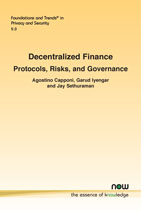Decentralized Finance: Protocols, Risks, and Governance
By Agostino Capponi, Department of Industrial Engineering and Operations Research, Columbia University, USA, ac3827@columbia.edu | Garud Iyengar, Department of Industrial Engineering and Operations Research, Columbia University, USA, garud@ieor.columbia.edu | Jay Sethuraman, Department of Industrial Engineering and Operations Research, Columbia University, USA, jay@ieor.columbia.edu
Abstract
Financial markets are undergoing an unprecedented transformation. Technological advances have brought major improvements to the operations of financial services. While these advances promote improved accessibility and convenience, traditional finance shortcomings like lack of transparency and moral hazard frictions continue to plague centralized platforms, imposing societal costs.
In this monograph, we argue how these shortcomings and frictions may be mitigated by the decentralized finance (DeFi) ecosystem. We delve into the workings of smart contracts, the backbone of DeFi transactions, with an emphasis on those underpinning token exchange and lending services.
We highlight the pros and cons of the novel form of decentralized governance introduced via the ownership of governance tokens. We argue that the current DeFi infrastructure introduces operational risks to users, which we segment into five primary categories: consensus mechanisms, protocol, oracle, frontrunning, and systemic risks.
We conclude by emphasizing the need for future research to focus on the scalability of existing blockchains, the improved design and interoperability of DeFi protocols, and the rigorous auditing of smart contracts.
Decentralized Finance: Protocols, Risks, and Governance
Financial markets are undergoing an unprecedented transformation. Technological advances have brought major improvements to the operations of financial services. While these advances promote improved accessibility and convenience, traditional finance shortcomings like lack of transparency and moral hazard continue to plague centralized platforms, imposing societal costs.
The advent of distributed ledger technologies presents an opportunity to alleviate some of the issues raised by centralized financial platforms, regardless of their integration of financial technology enhancements. These technologies have the potential to further disrupt the financial service industry by facilitating the transition to a decentralized trading environment, also referred to as decentralized finance (DeFi). DeFi enables the provision of services such as exchanges, lending, derivatives trading, and insurance without the need for a centralized intermediary. This monograph provides an overview of the DeFi ecosystem, with a focus on exchanges, lending protocols, and the decentralized governance structure in place. The monograph also discusses the operational risks inherent in the design of smart contracts and the DeFi ecosystem, and it concludes with remarks and directions for future research.
